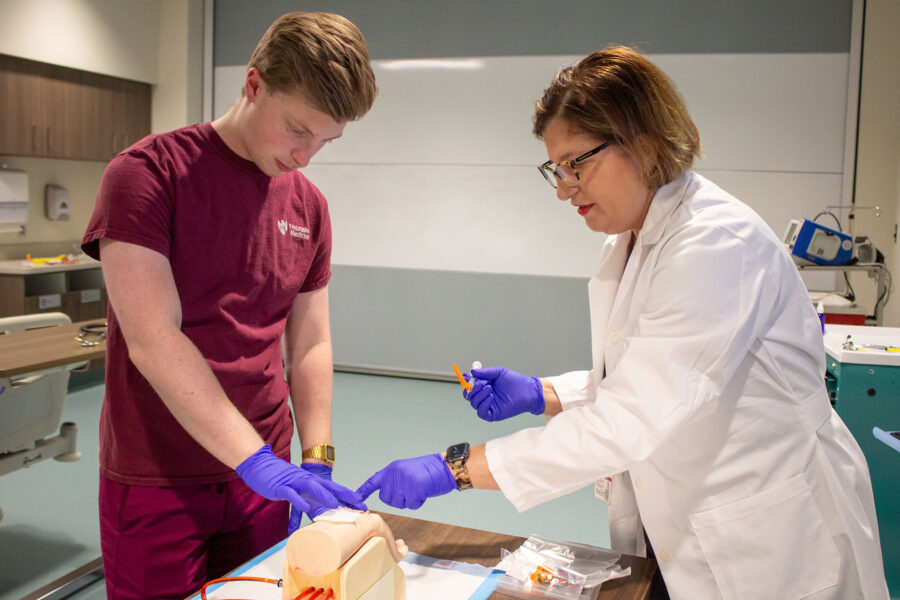The UNMC College of Allied Health Professions has begun recruiting the inaugural class for its 15th professional program, respiratory care. UNMC’s respiratory care program will enroll its first cohort of students in fall 2024 for both an “entry-level” master’s degree program and a degree-completion program for current respiratory therapists who want to obtain a master’s degree to practice their profession at its highest level in Nebraska.
It currently is just the ninth master’s degree respiratory care program in the U.S.
The University of Nebraska Board of Regents approved the program in 2021 to help meet workforce demands that are projected to increase by more than 20% over the next decade. UNMC, the college and its multiple clinical and educational partners have been laying the groundwork since, including the hiring of inaugural program director Lisa Fuchs, EdD.
What is respiratory therapy?
Respiratory therapists evaluate and treat people with heart and lung diseases ranging from acute respiratory tract infections and pneumonia to asthma, chronic lower respiratory disease and cystic fibrosis. In 2018, more than one million individuals in Nebraska and its six contiguous states were living with chronic lower respiratory diseases.
Work environments include hospitals, outpatient clinics, doctors’ offices, educational institutions, research, leadership, rehabilitation facilities, sleep disorder testing centers, pre-term infants, critical care units, emergency departments and air ambulances.
“The COVID-19 pandemic has elevated awareness about this important profession,” said Kyle Meyer, PhD, dean of the UNMC College of Allied Health Professions. “Workforce demand for respiratory therapists is projected to increase 23% nationally over the next decade. Our goal is to establish a premier graduate-level program to address this demand and ensure the highest quality care for the citizens of Nebraska and the region.”
Dr. Meyer noted that the new program has had strong support from Nebraska Medicine and Children’s Nebraska and has been endorsed at the national level by the National Board of Respiratory Care and the Coalition for Baccalaureate and Graduate Respiratory Care Education.
College leaders said respiratory care is an extraordinary profession requiring compassion and empathy while offering the opportunity to make an impact throughout the full spectrum of health care: “There’s no condition you can think of that doesn’t have some impact on lung function,” Dr. Fuchs said.
Implementing a master’s degree program, when more than 90% of current respiratory care programs are at the associate degree level, anticipates an emerging national trend for the profession. The Commission on Accreditation for Respiratory Care (CoARC) now requires new programs to be bachelor’s level or higher. And it follows a local trend, that of UNMC’s College of Allied Health Professions increasingly offering its educational programs at the highest degree possible.
Kyle Meyer, PhD, dean of the CAHP said: “Our goals in establishing this program were consistent with the goals for the college and all our programs: To be a national leader in preparing a highly qualified workforce, provide expanded opportunities for our graduates and lead the nation in advancing the allied health professions.”
Dr. Fuchs said a master’s level program means students and graduates will learn more advanced skills within the evolving scope of practice for respiratory therapists, such as assisting with managing ECMO (extracorporeal membrane oxygenation), intubating and performing lung ultrasounds, to name but a few. The program also will prepare graduates to assume leadership roles within the profession and prepare them for future opportunities in research and education.
“Our vision is to be a global leader in respiratory care education and innovation, inspiring and empowering a new era of respiratory care graduates to integrate emerging technologies, evidenced-informed, compassionate care and interprofessional collaboration to revolutionize the respiratory care profession,” Dr. Fuchs said.
UNMC’s program also sets itself apart through an emphasis on working with the neonatal pediatric population. Some respiratory therapists earn this special certification through continuing education following graduation. But much of the content to prepare graduates for certification will be embedded within UNMC’s “entry-level” master’s program.
UNMC’s College of Allied Health Professions respiratory care program will be the first respiratory care program physically located at Kearney. It will be taught synchronously in Omaha and at the Health Science Education Complex at the University of Nebraska at Kearney.
The program will consist of approximately 82 credit hours delivered over five semesters (21 months) and will award a Master of Respiratory Care degree. The program will be open to students who complete a minimum of 90 credit hours of prerequisite coursework at an undergraduate accredited university but will not require prior competence in respiratory therapy.
Information about the program and upcoming recruitment events may be found at this link.

I had a great experience of working and dealing with Respiratory diseases.